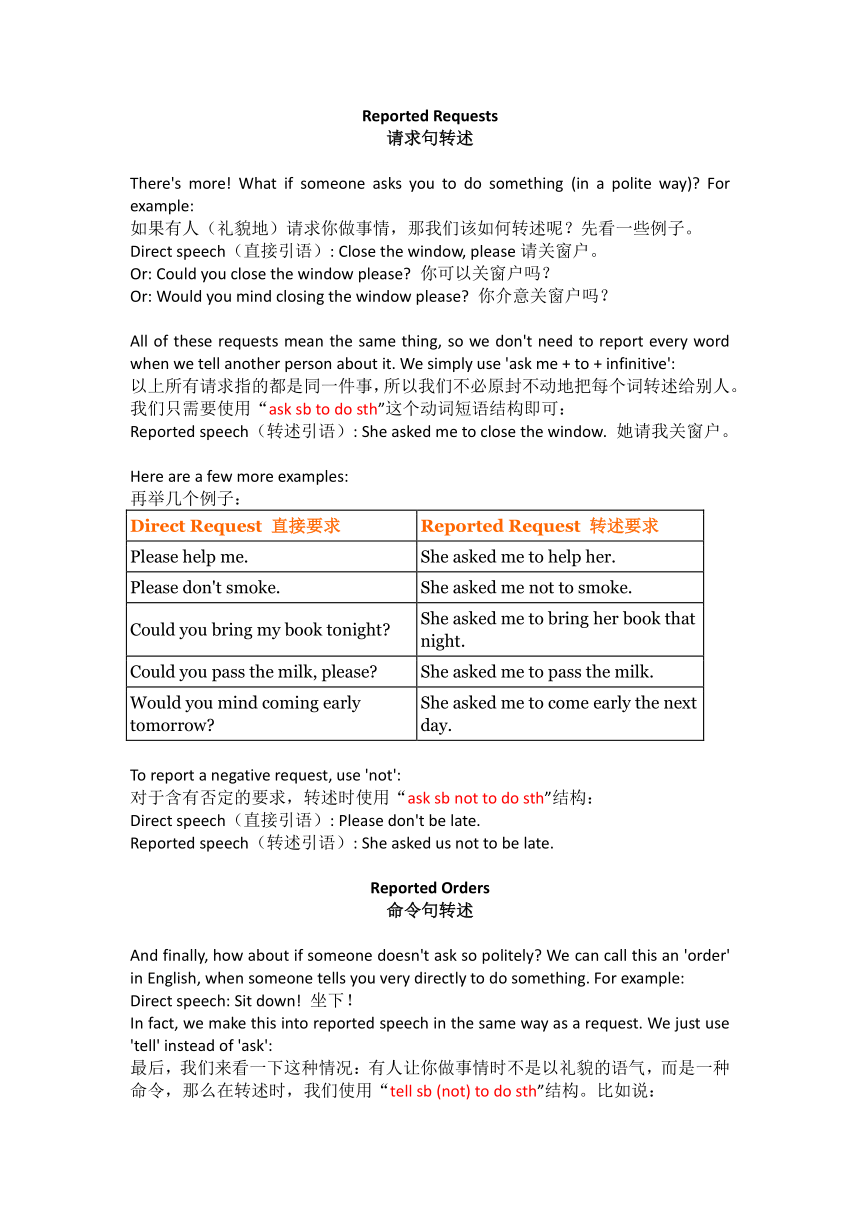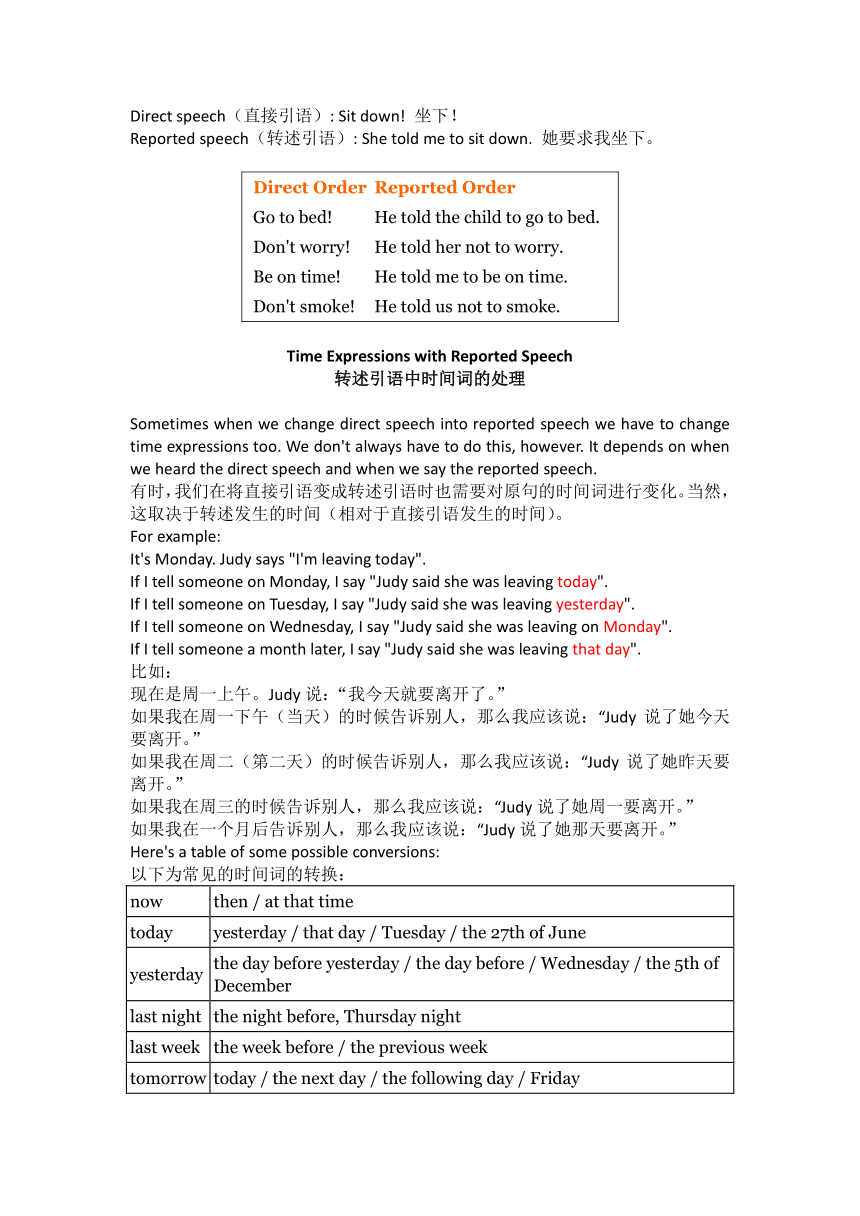高考英语专项 语法 时态 19 转述引语之请求和命令 讲解+练习+答案 reported requests and orders
文档属性
| 名称 | 高考英语专项 语法 时态 19 转述引语之请求和命令 讲解+练习+答案 reported requests and orders |

|
|
| 格式 | |||
| 文件大小 | 233.9KB | ||
| 资源类型 | 试卷 | ||
| 版本资源 | 通用版 | ||
| 科目 | 英语 | ||
| 更新时间 | 2024-03-06 14:59:25 | ||
图片预览


文档简介
Reported Requests
请求句转述
There's more! What if someone asks you to do something (in a polite way) For
example:
如果有人(礼貌地)请求你做事情,那我们该如何转述呢?先看一些例子。
Direct speech(直接引语): Close the window, please 请关窗户。
Or: Could you close the window please 你可以关窗户吗?
Or: Would you mind closing the window please 你介意关窗户吗?
All of these requests mean the same thing, so we don't need to report every word
when we tell another person about it. We simply use 'ask me + to + infinitive':
以上所有请求指的都是同一件事,所以我们不必原封不动地把每个词转述给别人。
我们只需要使用“ask sb to do sth”这个动词短语结构即可:
Reported speech(转述引语): She asked me to close the window. 她请我关窗户。
Here are a few more examples:
再举几个例子:
Direct Request 直接要求 Reported Request 转述要求
Please help me. She asked me to help her.
Please don't smoke. She asked me not to smoke.
She asked me to bring her book that
Could you bring my book tonight
night.
Could you pass the milk, please She asked me to pass the milk.
Would you mind coming early She asked me to come early the next
tomorrow day.
To report a negative request, use 'not':
对于含有否定的要求,转述时使用“ask sb not to do sth”结构:
Direct speech(直接引语): Please don't be late.
Reported speech(转述引语): She asked us not to be late.
Reported Orders
命令句转述
And finally, how about if someone doesn't ask so politely We can call this an 'order'
in English, when someone tells you very directly to do something. For example:
Direct speech: Sit down! 坐下!
In fact, we make this into reported speech in the same way as a request. We just use
'tell' instead of 'ask':
最后,我们来看一下这种情况:有人让你做事情时不是以礼貌的语气,而是一种
命令,那么在转述时,我们使用“tell sb (not) to do sth”结构。比如说:
Direct speech(直接引语): Sit down! 坐下!
Reported speech(转述引语): She told me to sit down. 她要求我坐下。
Direct Order Reported Order
Go to bed! He told the child to go to bed.
Don't worry! He told her not to worry.
Be on time! He told me to be on time.
Don't smoke! He told us not to smoke.
Time Expressions with Reported Speech
转述引语中时间词的处理
Sometimes when we change direct speech into reported speech we have to change
time expressions too. We don't always have to do this, however. It depends on when
we heard the direct speech and when we say the reported speech.
有时,我们在将直接引语变成转述引语时也需要对原句的时间词进行变化。当然,
这取决于转述发生的时间(相对于直接引语发生的时间)。
For example:
It's Monday. Judy says "I'm leaving today".
If I tell someone on Monday, I say "Judy said she was leaving today".
If I tell someone on Tuesday, I say "Judy said she was leaving yesterday".
If I tell someone on Wednesday, I say "Judy said she was leaving on Monday".
If I tell someone a month later, I say "Judy said she was leaving that day".
比如:
现在是周一上午。Judy 说:“我今天就要离开了。”
如果我在周一下午(当天)的时候告诉别人,那么我应该说:“Judy 说了她今天
要离开。”
如果我在周二(第二天)的时候告诉别人,那么我应该说:“Judy 说了她昨天要
离开。”
如果我在周三的时候告诉别人,那么我应该说:“Judy 说了她周一要离开。”
如果我在一个月后告诉别人,那么我应该说:“Judy 说了她那天要离开。”
Here's a table of some possible conversions:
以下为常见的时间词的转换:
now then / at that time
today yesterday / that day / Tuesday / the 27th of June
the day before yesterday / the day before / Wednesday / the 5th of
yesterday
December
last night the night before, Thursday night
last week the week before / the previous week
tomorrow today / the next day / the following day / Friday
Exercise 练习
Change the direct speech into reported speech. 将下列直接引语变成转述引语。
1 “Please help me carry this.” she asked me.
2 “Please come early.” she asked me.
3 “Please buy some milk.” she asked me.
4 “Could you please open the window ” she asked me.
5 “Could you bring the book tonight ” she asked me.
6 “Can you help me with my homework, please ” she asked me.
7 "Would you bring me a cup of coffee, please " she asked me.
8 "Would you mind passing the salt " she asked me.
9 "Would you mind lending me a pencil " she asked me.
10 "I was wondering if you could possibly tell me the time " she asked me.
11 "Do your homework!" she told me.
12 "Don't smoke!" she told me.
13 "Don't be late!" she told me.
14 "Go to bed!" she told me.
15 "Tidy your room!" she told me.
16 "Wait here!" she told me.
17 "Don't do that!" she told me.
18 "Eat your dinner!" she told me.
19 "Don't make a mess!" she told me.
20 "Do the washing-up!" she told me.
Key 答案
1 She asked me to help her carry this.
2 She asked me to come early.
3 She asked me to buy some milk.
4 She asked me to open the window.
5 She asked me to bring the book tonight/that night.
6 She asked me to help her with her homework.
7 She asked me to bring her a cup of coffee.
8 She asked me to pass the salt.
9 She asked me to lend her a pencil.
10 She asked me to tell her the time.
11 She told me to do my homework.
12 She told me not to smoke.
13 She told me not to be late.
14 She told me to go to bed.
15 She told me to tidy my room.
16 She told me to wait here/there.
17 She told me not to do that.
18 She told me to eat my dinner.
19 She told me not to make a mess.
20 She told me to do the washing up.
请求句转述
There's more! What if someone asks you to do something (in a polite way) For
example:
如果有人(礼貌地)请求你做事情,那我们该如何转述呢?先看一些例子。
Direct speech(直接引语): Close the window, please 请关窗户。
Or: Could you close the window please 你可以关窗户吗?
Or: Would you mind closing the window please 你介意关窗户吗?
All of these requests mean the same thing, so we don't need to report every word
when we tell another person about it. We simply use 'ask me + to + infinitive':
以上所有请求指的都是同一件事,所以我们不必原封不动地把每个词转述给别人。
我们只需要使用“ask sb to do sth”这个动词短语结构即可:
Reported speech(转述引语): She asked me to close the window. 她请我关窗户。
Here are a few more examples:
再举几个例子:
Direct Request 直接要求 Reported Request 转述要求
Please help me. She asked me to help her.
Please don't smoke. She asked me not to smoke.
She asked me to bring her book that
Could you bring my book tonight
night.
Could you pass the milk, please She asked me to pass the milk.
Would you mind coming early She asked me to come early the next
tomorrow day.
To report a negative request, use 'not':
对于含有否定的要求,转述时使用“ask sb not to do sth”结构:
Direct speech(直接引语): Please don't be late.
Reported speech(转述引语): She asked us not to be late.
Reported Orders
命令句转述
And finally, how about if someone doesn't ask so politely We can call this an 'order'
in English, when someone tells you very directly to do something. For example:
Direct speech: Sit down! 坐下!
In fact, we make this into reported speech in the same way as a request. We just use
'tell' instead of 'ask':
最后,我们来看一下这种情况:有人让你做事情时不是以礼貌的语气,而是一种
命令,那么在转述时,我们使用“tell sb (not) to do sth”结构。比如说:
Direct speech(直接引语): Sit down! 坐下!
Reported speech(转述引语): She told me to sit down. 她要求我坐下。
Direct Order Reported Order
Go to bed! He told the child to go to bed.
Don't worry! He told her not to worry.
Be on time! He told me to be on time.
Don't smoke! He told us not to smoke.
Time Expressions with Reported Speech
转述引语中时间词的处理
Sometimes when we change direct speech into reported speech we have to change
time expressions too. We don't always have to do this, however. It depends on when
we heard the direct speech and when we say the reported speech.
有时,我们在将直接引语变成转述引语时也需要对原句的时间词进行变化。当然,
这取决于转述发生的时间(相对于直接引语发生的时间)。
For example:
It's Monday. Judy says "I'm leaving today".
If I tell someone on Monday, I say "Judy said she was leaving today".
If I tell someone on Tuesday, I say "Judy said she was leaving yesterday".
If I tell someone on Wednesday, I say "Judy said she was leaving on Monday".
If I tell someone a month later, I say "Judy said she was leaving that day".
比如:
现在是周一上午。Judy 说:“我今天就要离开了。”
如果我在周一下午(当天)的时候告诉别人,那么我应该说:“Judy 说了她今天
要离开。”
如果我在周二(第二天)的时候告诉别人,那么我应该说:“Judy 说了她昨天要
离开。”
如果我在周三的时候告诉别人,那么我应该说:“Judy 说了她周一要离开。”
如果我在一个月后告诉别人,那么我应该说:“Judy 说了她那天要离开。”
Here's a table of some possible conversions:
以下为常见的时间词的转换:
now then / at that time
today yesterday / that day / Tuesday / the 27th of June
the day before yesterday / the day before / Wednesday / the 5th of
yesterday
December
last night the night before, Thursday night
last week the week before / the previous week
tomorrow today / the next day / the following day / Friday
Exercise 练习
Change the direct speech into reported speech. 将下列直接引语变成转述引语。
1 “Please help me carry this.” she asked me.
2 “Please come early.” she asked me.
3 “Please buy some milk.” she asked me.
4 “Could you please open the window ” she asked me.
5 “Could you bring the book tonight ” she asked me.
6 “Can you help me with my homework, please ” she asked me.
7 "Would you bring me a cup of coffee, please " she asked me.
8 "Would you mind passing the salt " she asked me.
9 "Would you mind lending me a pencil " she asked me.
10 "I was wondering if you could possibly tell me the time " she asked me.
11 "Do your homework!" she told me.
12 "Don't smoke!" she told me.
13 "Don't be late!" she told me.
14 "Go to bed!" she told me.
15 "Tidy your room!" she told me.
16 "Wait here!" she told me.
17 "Don't do that!" she told me.
18 "Eat your dinner!" she told me.
19 "Don't make a mess!" she told me.
20 "Do the washing-up!" she told me.
Key 答案
1 She asked me to help her carry this.
2 She asked me to come early.
3 She asked me to buy some milk.
4 She asked me to open the window.
5 She asked me to bring the book tonight/that night.
6 She asked me to help her with her homework.
7 She asked me to bring her a cup of coffee.
8 She asked me to pass the salt.
9 She asked me to lend her a pencil.
10 She asked me to tell her the time.
11 She told me to do my homework.
12 She told me not to smoke.
13 She told me not to be late.
14 She told me to go to bed.
15 She told me to tidy my room.
16 She told me to wait here/there.
17 She told me not to do that.
18 She told me to eat my dinner.
19 She told me not to make a mess.
20 She told me to do the washing up.
同课章节目录
- 名词
- 动词/动词短语
- 一般现在时及其被动式
- 一般过去时及其被动式
- 现在进行时及其被动式
- 过去进行时及其被动式
- 将来进行时及其被动式
- 现在完成时及其被动式
- 过去完成时及其被动式
- 一般将来时及其被动式
- 过去将来时及其被动式
- 现在完成进行时及其被动式
- 将来完成时及其被动式
- 副词
- 介词/介词短语
- 连词/连接词
- 数词/量词
- 冠词
- 形容词
- 非谓语动词
- 句型
- 简单句与并列句
- 复合句
- 主谓一致
- 倒装与省略
- 强调句
- 虚拟语气
- 插入语
- 固定句型
- 祈使句/感叹句
- 疑问句/反义疑问句
- 非限制性定语从句
- 句型转换
- 定语从句
- 表语从句
- 宾语从句
- 主语从句
- 动词时态与语态
- 虚拟语气与情态动词
- 主谓一致
- 独立主格结构、with的复合结构
- 情态动词
- 状语从句
- 定语从句
- 特殊句式
- 交际用语
- 代词/不定代词
- 名词性从句
- 同位语从句
- 表语从句
- 宾语从句
- 主语从句
- 直接引语和间接引语
- 构词法(word formation)
